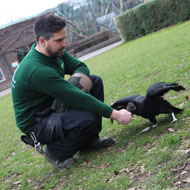
Pair of vultures go on a daily walk to build a friendship
Keepers at London Zoo have taken it upon themselves to take a pair of vultures for a walk each day, as part of a bonding exercise to help the animals become firm friends.
Black vulture Jaffar is a newcomer at the zoo and keepers want to help him get to know nine-year-old resident Guido.
To keep the vultures to heel on their walks, keepers use their favourite meaty snacks. However, the birds do occasionally take off for a circuit of the zoo, showing off their natural behaviour of searching for food.
According to zoo staff, their daily walks with the vultures have attracted some open-mouthed stares from visitors.
"We’ve had a few strange looks from visitors when we’re out on the walks with the vultures – with their comical hopping gait, and huge 1.9 metre wing span (4.9 feet), they’re hard to miss," said zookeeper Grant Kother.
He explained: "The walks are really beneficial for these incredibly intelligent birds, not only are they forming a great bond with each other, but Jaffar loves getting attention from his keepers and is really enjoying his new training here at ZSL London Zoo."
Once the pair have got well acquainted, they will both be making an appearance in the zoo's "Deadly Birds" demonstration this spring. Mr Kother said this helps visitors to understand why black vultures need protection.
The species is in global decline, particularly in Nepal and Asia. It is threatened by a medicine given to cows, which the birds then eat.
Vultures are often referred to as "nature's bin-men". They play an important role in preventing disease and keeping habitats clean by eating the carcasses of dead animals.
Image courtesy of ZSL London Zoo



 The RCVS has announced a new version of its 1CPD mobile app, with enhanced features for veterinary surgeons and veterinary nurses to record their continuing professional development.
The RCVS has announced a new version of its 1CPD mobile app, with enhanced features for veterinary surgeons and veterinary nurses to record their continuing professional development.